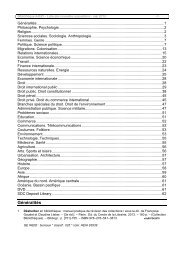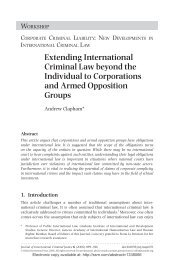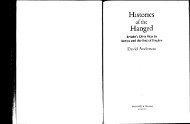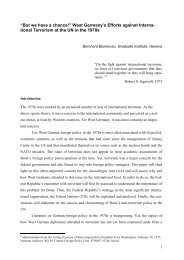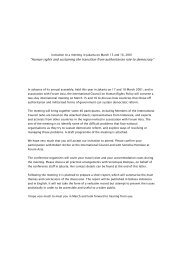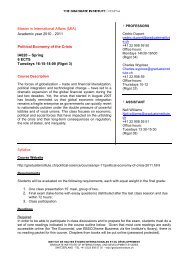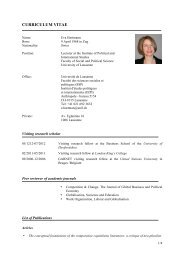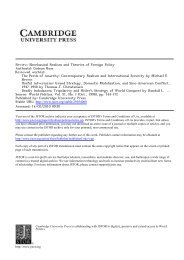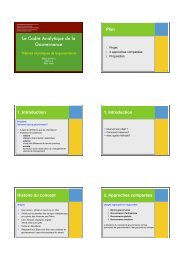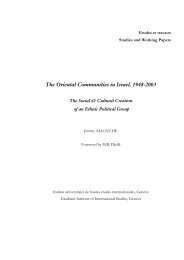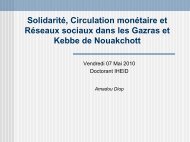The 1953 Coup D'etat in Iran Author(s): Mark J. Gasiorowski Source ...
The 1953 Coup D'etat in Iran Author(s): Mark J. Gasiorowski Source ...
The 1953 Coup D'etat in Iran Author(s): Mark J. Gasiorowski Source ...
You also want an ePaper? Increase the reach of your titles
YUMPU automatically turns print PDFs into web optimized ePapers that Google loves.
276 <strong>Mark</strong> J. <strong>Gasiorowski</strong><br />
want to participate <strong>in</strong> <strong>Iran</strong> at this time, it took a major effort by U.S. policy-<br />
makers to persuade them to become <strong>in</strong>volved.70<br />
<strong>The</strong> Eisenhower adm<strong>in</strong>istration therefore seems to have been motivated ma<strong>in</strong>ly<br />
by fears of a communist takeover <strong>in</strong> <strong>Iran</strong> rather than by a desire to promote U.S.<br />
commercial <strong>in</strong>terests. It should be noted that most middle level State Department<br />
and CIA officials did not believe that a coup was necessary to avert a communist<br />
takeover. Neither Henry Byroade, the Assistant Secretary of State with responsi-<br />
bility for the Middle East, nor Ambassador Henderson favored a coup <strong>in</strong> early<br />
<strong>1953</strong>. As discussed above, <strong>Iran</strong> specialists <strong>in</strong> the CIA and the CIA station chief <strong>in</strong><br />
Tehran were also opposed to a coup. CIA analysts did not regard Mosaddeq as a<br />
communist and the Tudeh was not believed to be capable of seiz<strong>in</strong>g power at this<br />
time. Rather, the Tudeh was thought to be pursu<strong>in</strong>g a "popular front" strategy<br />
by <strong>in</strong>filtrat<strong>in</strong>g the army and the government bureaucracy and try<strong>in</strong>g to ga<strong>in</strong> favor<br />
with Mosaddeq and other National Front leaders. CIA analysts had concluded<br />
<strong>in</strong> November 1952 that a Tudeh takeover was not likely before the end of <strong>1953</strong>.<br />
Moreover, the <strong>Iran</strong>ian economy had become relatively stable by this time, so a<br />
general collapse was not viewed as imm<strong>in</strong>ent. <strong>The</strong> fears of a communist takeover<br />
that prompted the coup therefore seem to have orig<strong>in</strong>ated at the highest levels of<br />
the CIA and the State Department, and were not shared by lower-level <strong>Iran</strong><br />
specialists.71<br />
What roles did Brita<strong>in</strong> and the various <strong>Iran</strong>ian participants play? <strong>The</strong> British<br />
role <strong>in</strong> the coup itself appears to have been limited to assistance <strong>in</strong> the formula-<br />
tion of the orig<strong>in</strong>al coup plan and the contribution of the Rashidian network.<br />
<strong>The</strong> orig<strong>in</strong>al plan, of course, had little bear<strong>in</strong>g on how the coup actually occurred,<br />
and the Rashidians do not seem to have played a particularly crucial role <strong>in</strong> the<br />
coup itself. Of much greater significance was the British role <strong>in</strong> underm<strong>in</strong><strong>in</strong>g<br />
Mosaddeq's position throughout the time he was prime m<strong>in</strong>ister. <strong>The</strong> British<br />
plotted aga<strong>in</strong>st Mosaddeq almost cont<strong>in</strong>uously, back<strong>in</strong>g three major, protracted<br />
efforts to oust him. Brita<strong>in</strong> also <strong>in</strong>stituted an oil embargo and a variety of other<br />
economic sanctions aga<strong>in</strong>st <strong>Iran</strong>. <strong>The</strong>se activities were largely responsible for the<br />
gradual erosion of Mosaddeq's base of support. <strong>The</strong> consequent erosion that<br />
occurred contributed to his downfall, and as such, these actions helped to br<strong>in</strong>g<br />
about the overthrow of Mosaddeq.<br />
Four ma<strong>in</strong> groups of <strong>Iran</strong>ians were <strong>in</strong>volved <strong>in</strong> the coup. First, an obvious role<br />
was played by Zahedi and his immediate allies, <strong>in</strong>clud<strong>in</strong>g his son, Abul Qasem<br />
Bakhtiari, and military officers such as Hejazi, Nassiri, Guilanshah, and Bakhtiar.<br />
Zahedi and several of these figures had been conspir<strong>in</strong>g aga<strong>in</strong>st Mosaddeq for<br />
about a year before the coup; the others led military units or played important<br />
support roles <strong>in</strong> the coup itself. Second, former Mosaddeq allies such as Kashani<br />
and Baqai worked to underm<strong>in</strong>e Mosaddeq's base of support <strong>in</strong> the year before<br />
the coup, and Kashani at least appears also to have played an important role <strong>in</strong><br />
the coup. Third, Nerren and Cilley and the Rashidians played key roles <strong>in</strong><br />
carry<strong>in</strong>g out the coup and <strong>in</strong> supervis<strong>in</strong>g anti-Mosaddeq activities <strong>in</strong> the period<br />
before the coup. F<strong>in</strong>ally, the Shah himself played a significant, although reluctant,<br />
role <strong>in</strong> acquiesc<strong>in</strong>g to the coup.72 Beyond these specific people, a relatively small<br />
but <strong>in</strong>determ<strong>in</strong>ate number of <strong>Iran</strong>ians either volunteered or were hired to partici-<br />
pate <strong>in</strong> anti-Mosaddeq demonstrations and other activities.



![Download [pdf] - The Graduate Institute, Geneva](https://img.yumpu.com/23370020/1/190x248/download-pdf-the-graduate-institute-geneva.jpg?quality=85)
